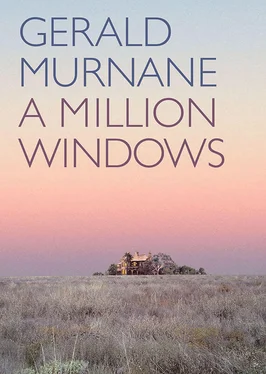There was much more to the dream, so much more that I spent most of the morning trying to find connections between the subject-matter of the dream and what might be called the underlying meaning of this work of fiction. Then, at lunchtime, I told the others a little about my dream and I tried to introduce into the slight-seeming discussion taking place in the common-room in this corridor these two questions: what differences, if any, may be said to exist between personages such as her whom I named Wilma and those personages who appear to us often while we write? And, if any such differences may be said to exist, must we conclude that the two sorts of personages have their origins in two separate places?
I had expected some of those in the room to be annoyed by my questions, but I was hardly prepared for what took place. One of them set up at once a certain catchcry and moved towards the door. The others, every one of them, took up the catchcry and picked up their sandwiches and pies and pasties and apples and bananas and moved to follow the first man. Describe a dream — lose a reader! was their cry, and I was all the more annoyed because I recalled having passed on to them those very words long before, when I was telling them some of the advice that I had read many years before in books published in the USA for the guidance of teachers and students of creative writing, so to call it.
They brought their lunches back to the table after I had promised to say no more about my dream or about my interest in the possible connections between what we dream while asleep and what we see in mind while we write fiction. I supposed that my having mentioned my mother or, I should say, a dream-image of my mother, had caused them to believe I had gone over to the enemy: that I had become some sort of follower of the twentieth-century theorists who had seemed to their followers to have explained the workings of the mind, as though a leaning blade of grass might have found itself capable of explaining the source and the destination of the wind that overpowers it. No one was less likely than I to accept any theory of the mind, and I wish that my colleagues had heard me out and had offered comments after I had been able to tell them that Wilma, so to call her, had later, in reply to my asking her, as I often ask strangers in order to start a conversation, where she came from, had told me that she had grown up in Gormenghast , which is the title of a work of fiction that I read more than forty years ago and have quite forgotten except for the detail that the setting, so to call it, of the work is a building many times more vast than this.

Reader, whether you discern or struggle to discern, you should hardly be aggrieved to learn that the writer of this and the following paragraphs is not an occupant, even for the time being, of any visible building of two or, perhaps, three storeys but rather a man past middle-age and older by several years than was the writer who was mentioned much earlier in this work as having been run down and killed while walking home drunkenly of an evening in a certain provincial city of this state. I am like the other writer in that I moved, late in life, away from the capital city of this state. He moved to a large provincial city in the near-west. I moved to a small township in the far west. In the city whither he had moved, many a building is of two or, perhaps, three storeys, which suggests that he may well have seen, while he walked drunkenly homewards on many an evening, one or more windows looking like drops of golden oil, after which he might have concluded that if he were to be run down a few moments later and were to lie dying on the roadside, he could take satisfaction from his perceiving that his life had been all of a piece.
In the small township whither I moved late in life, no house is of more than one storey. We have grain-silos at the edge of the township and a water-tower near the main street, but whenever I walk home drunkenly I see around me nothing resembling a drop of golden oil. I am aware, however, that the township is surrounded on all sides by mostly level grassy countryside. Every street in the township ends at a view of sheep paddocks or croplands. The butterflies reported earlier as passing through Casterbridge might not even perceive any change in their surroundings if they were to flit over our few streets, where the silence is so profound that the sound of a single motor vehicle can be heard from far away, even by a drunken person. And even if, while I stride homewards with the faintly comical precision of a drunkard, some vehicle should unaccountably appear in my path and should run me down, then I would lie dying with the same equanimity that may have possessed the other writer. Around him, in the towering buildings erected by those grown wealthy from mining, the golden windows would have reminded him of his autobiography, long since published and acclaimed. Around me would appear not actual sights but images of a desk and a bookshelf and a window that I could not doubt had appeared sometimes to a distant observer as a drop of golden oil.

Whenever we learn that one of us is drawing up plans or making notes for a wholly new piece of fiction, we assume, unless the plan-drawer and note-maker has told us otherwise, that his deciding on a new work has come about not as a result of his feeling as though he is in possession of an abundant or overflowing quantity of knowledge but from quite the opposite — from his feeling that he knows too little about a certain subject and ought to know much more. The phrase a certain subject in the previous sentence might suggest that what provokes the author is the sort of thing that might provoke a philosopher or a psychologist or a so-called social scientist to embark on a so-called research project, but our sort of author has little in common with those sorts of investigators. He, our author, is likely to be aware of no more than a few clustered images or even of one image. Sometimes, the image may be complex and may seem to yield some of its meaning almost at first sight, as, for example, an image of a castle with each room occupied by a character from some or another film; sometimes, the image may be simple and may seem to be of scant meaning as, for example, an image of a window-pane coloured gold by the afternoon sunlight. Whatever sort of image the author has in mind, he feels a certain feeling seeming to emanate from the image. The feeling is persistent, intense, and sometimes troubling, and yet, at the same time, promising. When the author first becomes aware of this feeling, he might seem to receive the same sort of wordless message that sometimes reaches him from some or another image-person or image-object in some or another dream. He seems to receive wordlessly the message: Write about me in order to discover my secret and to learn what a throng of images, as yet invisible, lie around me . (Is even the least discerning reader surprised to learn how different are our methods from those of the numerous group that we call, contemptuously, the paraphrasers of yesterday’s newspaper headlines: those who write, often with what is praised as moral indignation or incisive social commentary, about matters that none of us in this building has ever understood, let alone wanted to comment on?)
And so, in time, the writer begins to write, but not before he has given thought to the question what form of narration he had best employ. The author whose deciding to write a wholly new piece of fiction is, for the time being, my own subject-matter has chosen, let us suppose, the very method of narration that I would have chosen in his circumstances, which is the same method of narration that I have used throughout the work of fiction of thirty-four sections of which this it the thirty-first section. The author has chosen to report in the third person and in the past tense the thoughts and deeds of a chief character while reserving the right to comment in the first person if the need arises. As confusing as it may seem to an undiscerning reader, I have to remind every sort of reader that an author who chooses thus to report is not merely choosing a certain form of narration but is casting himself in the role of a certain sort of personage.
Читать дальше










